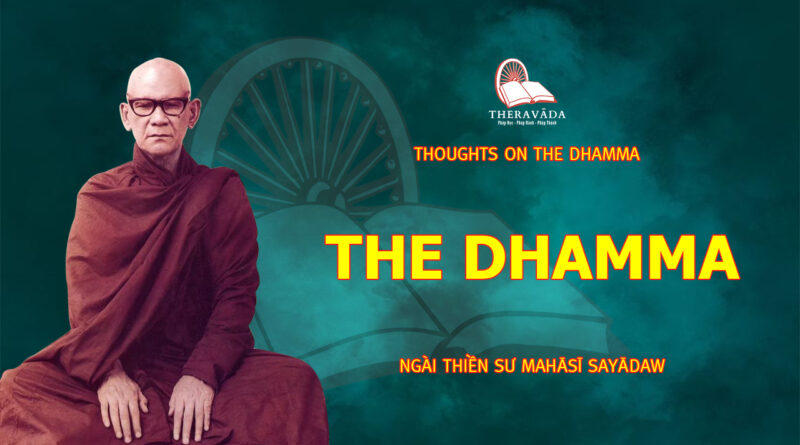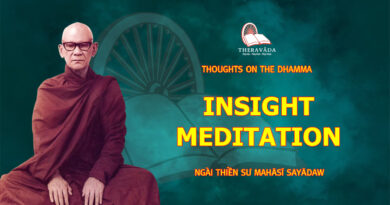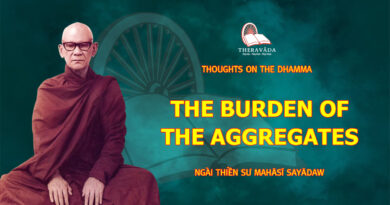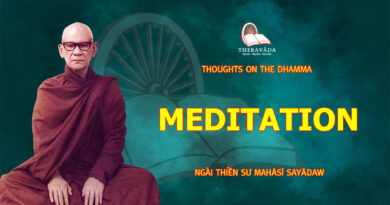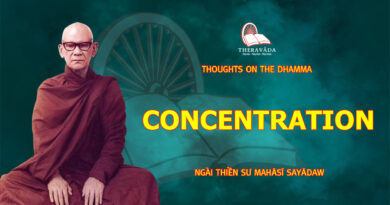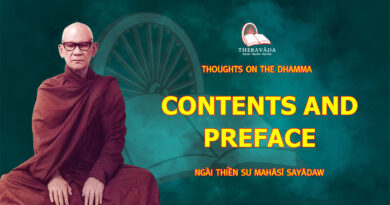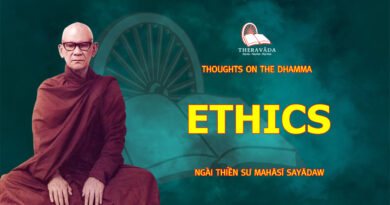Nội Dung Chính [Hiện]
2. The Dhamma
One Truth
Indeed, truth must be one and indivisible. This must be borne in mind. Nowadays, when Buddha-dhamma is being disseminated, there should be only one basis of teaching relating to the Middle Way or the Eightfold Path: the practice of morality, concentration, and acquisition of profound knowledge, and the Four Noble Truths. But if one were preaching that the aims and objects of Buddhism can be achieved without recourse to the actual practice of the Dhamma, we should understand that such a one has strayed from the Path.
— Discourse on To Nibbana via the Noble Eightfold Path —
The Need for Practice
In these days there have cropped up misstatements running counter to what Buddha actually taught. Knowledge, it is said, is accomplishment; and there is no need for anyone to practice Dhamma once knowledge has been attained. Such a statement virtually amounts to the rejection of the practice of the Dhamma, to the exclusion of the Noble Eightfold Path. But in point of fact, the Noble Eightfold Path is to be constantly practiced, for it is a set of disciplines to be cultivated (bhavetabba) which can generate the power to gain insight into the nature of the Path. Without effort, nothing comes up naturally. And yet there is a school of thought which wrongly suggests that making an effort itself is dukkha or unsatisfactoriness, and that therefore, it should not be indulged in. In the face of such dogma who will be prepared to take the trouble of meditating upon the Noble Eightfold Path and practice its tenets? If there is no one to practice this Dhamma, how can its light shine within him? And in the absence of any insight into the nature of the Path, how can one eliminate defilements and attain Nibbanic peace?
— Discourse on To Nibbana via the Noble Eightfold Path —
The Path in Three Stages
Good Buddhists are in the habit of wishing for realization and attainment of Nibbana whenever they accomplish any meritorious deed. The summum bonum will not, of course, be attained immediately by their mere wishing. It will be attained only in one of the higher planes which they will reach by virtue of their good deeds; and then only if they actually practice developing the Eightfold Path. So, why wait till future existence? Why not start now and work for liberation in this very life?
— Discourse on The Wheel of Dhamma —
Putting Knowledge into Practice
According to the Buddha, knowledge relating to the Noble Path transports one to the stage where all suffering or unsatisfactoriness ceases. But it must always be borne in mind that the Path offers salvation only to those who actually practice it.
In your travels a vehicle takes you to your destination while those who stand by it are left behind. Knowledge about the Noble Path is like that vehicle. If you ride in it, you will be conveyed to your destination; and if you merely stand by it, you will be left behind. Those who desire to be liberated from all sufferings should use that vehicle. That is to say they should use knowledge they gained for practical purposes. The most important task for you while you are born into this Buddha Sasana is to practice Dhamma so that you reach Nibbana, where all sufferings cease.
— Discourse on To Nibbana via the Noble Eightfold Path —
The True Faith
The theory of rejection of kamma is gradually gaining more favorable attention because people’s greed (lobha) is increasing and their hankering after sensual pleasures is making a corresponding increase. Nowadays, there are some who are of the opinion that if one avoids evil deeds, one will not achieve any useful purpose. That view leads people to these false faiths.
The ignorance of kamma and its effect that is becoming rife now, is the result of overwhelming greed (lobha) superimposed by delusion (moha).
The Buddha himself realized this and so he urged people to make efforts to reduce the volume of greed and delusion. Faithful disciples will follow the Buddha’s directions and try to reach realization through meditational practice, and thus free themselves from these false faiths. They come to realize that the kamma of the previous existences had made them what they are in the present existence, and the kamma of the present existence, if not yet free of craving (tanha), will determine the state of the next existence. Thus, they confirm their belief in the true faith.
— Discourse on the Hemavata Sutta —
The Deities’ Dissatisfaction
Do not have the impression that if one becomes a celestial being owing to one’s good deeds, one gets to a place where every wish is fulfilled and one does not need to have any more wishes; that is, one would be satisfied to the full. No being is ever satisfied with what has been given, and will always ask for more. To get more, further efforts have to be made, and suffering ensues from these efforts.
— Discourse on the Hemavata Sutta —
The Great Pity
Men are just living their lives without being actually aware of the slow and gradual deterioration of their bodies and the onset of disease of one kind or another till at the last moment when nothing can be done to cure the disease, death is at hand. Then only do they realize the sad fact.
The same pattern applies to man’s next existence; the gradual deterioration of the body, the onset of old age and disease, and the eventual death. This the Buddha perceived. He surveyed millions of ailing beings and dying beings, and the sorrows of those who are near and dear to them, and a great pity arose in him. “Millions upon millions” is the current term, but in reality the number is countless. If the history of a being’s existences were to be illustrated pictorially, the pictures so depicted would fill the entire surface of the earth, and more space would be needed. The pictures of the being’s birth, old age, illness, and death were perceived by the Buddha who felt a great pity for that being; that was how the great pity, or maha karuna arose in him.
— Discourse on the Hemavata Sutta —
Slavery
The Buddha saw that all beings were slaves of lust and greed, and that moved him to great pity. Living beings serve their lust and greed even at the risk of their lives. They go out in search of the things their lust or greed urges them, and risk their lives to get them. They have to work daily for all their lives to satisfy their lust and greed, and after death, and in the next existence, too, they remain slaves of the same master, craving (tanha). There is no period of rest for them.
In this world a slave may remain a slave only during his lifetime, but a slave of lust has an unending term of servitude till the time of salvation when he becomes an arahant and thus ends his wandering through samsara.
— Discourse on the Hemavata Sutta —
Listening to the Dhamma
To attain realization of the Dhamma while listening to a sermon, one must have a settled mind, for it is only through concentrated attention with a settled mind that one can attain samadhi, (concentration), and only samadhi can still the mind for insight. If the mind wanders during the sermon over domestic, economic, and other secular affairs, samadhi will not be attained. If anxiety sets in, it is all for the worse. If distraction and anxiety crop up, the essence of the Dhamma will slip, and as samadhi is lacking, there will be no insight, and if one cannot attain insight for vipassana, how can one attain realization of the Dhamma? Concentrated attention while listening to a sermon is, therefore, an important factor.
The listener must listen carefully, with full mental involvement, and the words of the Dhamma must be adhered to in practice. If one attends to a sermon in this way, one’s mind will be calm and absorbed in the sermon; one will be free from interference, and thus attain purity of mind.
— Discourse on the Hemavata Sutta —
Self
There are three different views of the ego or self. The first is the belief in self as the soul-entity. The second is the view of self based on conceit and pride. The third is the self as a conventional term for the first person singular as distinct from other persons. The self or “I” implicit in “I walk” has nothing to do with illusion or conceit. It is a term of common usage that is to be found in the sayings of the Buddha and arahants.
— Discourse on the Ariyavasa Sutta —
____________________

